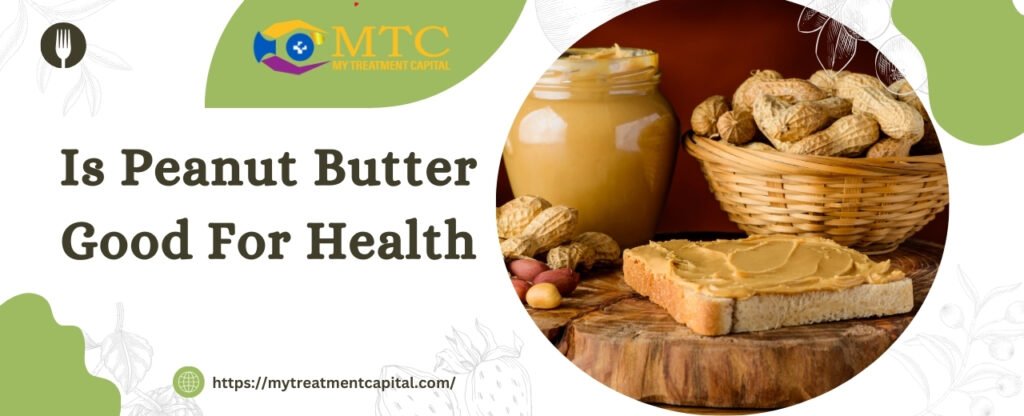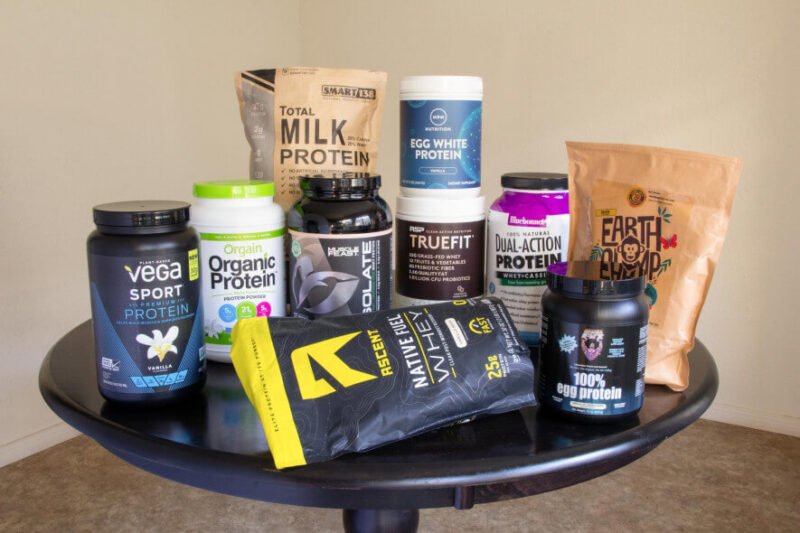Peanut butter is a popular spread among people all over the world. Made from pulverized peanuts, it has a variety of nutrients that can provide numerous health benefits. When choosing peanut butter, it is vital to consider the ingredients, as some products may include sugar, vegetable oil, and trans fats, which can reduce its nutritious value. Is peanut butter good for you? In this article, we will look at peanut butter’s potential health advantages, nutritional makeup, and implications for people with dietary restrictions or allergies.
The Nutritional Profile of Peanut Butter
Peanut butter contains various key elements that promote overall wellness. A 2 tablespoon serving of natural peanut butter includes approximately:
- Calories: 190
- Protein: 8 grams
- Fat: 16 grams
- Carbohydrates: 7 grams
- Fibre: 3 grams
- Sugar: 1 gram
- Vitamin K: 8% of the DV
- Magnesium: 20% of the DV
- Manganese: 20% of the DV
In addition to these macronutrients, peanut butter is a good source of various vitamins and minerals, including vitamin E, niacin (vitamin B3), manganese, vitamin B6, and magnesium. It also contains copper, which plays a crucial role in bone health, immune function, and blood vessel maintenance.
Peanut Butter Types
Here are some types of Peanut Butter:
i. Natural Peanut Butter
Natural peanut butters are made with only one ingredient: peanuts. They often have less saturated fat, no salt, and less sugar.
ii. Creamy Peanut Butter
This type of peanut butter is ground to a paste. It is smooth and ideal for spreads, smoothies, and dips.
iii. Crunchy Peanut Butter
If you prefer more texture, crunchy peanut butter is for you. This style contains peanuts for added crunch.
Health Benefits of Peanut Butter
Peanut butter, when consumed in moderation as part of a well-balanced diet, can provide numerous health advantages. Let’s look at some of the potential advantages:
1. Improved Heart Health
Peanut butter has a significant favourable impact on heart health. Peanut butter contains monounsaturated fats, particularly oleic acid, which can help maintain healthy cholesterol, blood sugar levels, and blood pressure. Peanut butter may help to lower the risk of heart disease by addressing these risks. Peanuts also include omega-6 fatty acids, which reduce LDL (bad) cholesterol while increasing HDL (good) cholesterol. Furthermore, peanuts are a natural source of arginine, an amino acid that promotes healthy blood vessel function and helps prevent heart and vascular diseases.
2. Lower Risk of Diabetes
Peanut butter may also help reduce the risk of diabetes. Peanut butter contains oleic acid, which helps to reduce insulin resistance, a condition that can cause high blood sugar levels and the development of diabetes. According to research, peanut butter’s omega-6 concentration may have a similar effect on lowering the risk of diabetes. They’re a perfect quick and easy low-carb snack for people with type 2 diabetes.
3. Anticancer Properties
Peanuts, and consequently peanut butter, are high in antioxidants like manganese, vitamin E, and B vitamins. These substances help to prevent and repair cell damage in the body, potentially reducing the incidence of chronic diseases like cancer. Coumaric acid, a potent antioxidant present in peanut butter, is more active when peanuts are roasted before being combined into butter. Furthermore, peanuts contain resveratrol, an antioxidant with anti-cancer properties that may lower the risk of obesity, heart disease, and cognitive decline.
4. Weight Management
Peanut butter, despite its relatively high calorie content, can help with weight management when consumed in moderation. Peanut butter contains healthy fats, proteins, and fibre, which contribute to satiety, keeping you content for longer and minimising the likelihood of overeating. A well-balanced diet that includes nutrient-dense foods like peanut butter can help with weight loss and maintenance. Researchers think peanut butter is associated with an increase in the production of peptide YY (PYY), a feel-full hormone therefore satisfying your appetite.
Dietary Risk Associated with Peanut Butter
While peanut butter has many health benefits, there are several key things to keep in mind:
1. Peanut Allergy
It is important to know that peanut butter can cause serious allergic responses in people who have peanut allergies. People with peanut allergy should avoid all peanut products to avoid negative health consequences. If you or someone you know has a peanut allergy, you should read food labels carefully and prevent any potential exposure to peanuts or peanut products.
2. Caloric Density
Peanut butter has a rather high calorie content due to its nutritional density. Portion control is essential for avoiding excessive calorie intake, which can lead to weight gain. Moderation is critical when introducing peanut butter into your diet to ensure it aligns with your overall calorie goals.
3. Fat Content
While the bulk of fats in peanut butter are beneficial monounsaturated and polyunsaturated fats, peanuts do include some saturated fat. Saturated fats should be consumed in moderation to ensure heart health. Incorporating a range of healthy fats from diverse sources will help you achieve a well-balanced diet.
4. Mineral Absorption
Peanuts are high in phosphorus, which can impair the absorption of other minerals like zinc and iron in the body. If you are deficient in certain minerals, you should limit your phosphorus intake. A high-phosphorus diet may worsen zinc and iron deficits.
Other Nut Butters as Alternatives
For those with dietary restrictions or allergies, there are alternative nut butters that offer similar nutritional benefits to peanut butter:
1. Almond Butter
Almond butter is created from ground almonds and has a somewhat distinct taste than peanut butter. It has a higher concentration of monounsaturated fats per serving, making it good for heart health. Almond butter contains less sugar and more calcium than peanut butter.
2. Macadamia Nut Butter
Macadamia nut butter has a buttery feel and is high in healthful fats. While it includes more calories than peanut butter, it also has the most beneficial fats of any nut butter. According to research, the minerals included in macadamia nuts may help prevent coronary artery disease.
3. Walnut Butter
Walnut butter is a nutritional option that contains a healthy balance of omega-3 and omega-6 fatty acids. It has fewer calories and fat than peanut butter, making it ideal for weight loss.
When selecting a nut butter, it is critical to study the labels and choose products that do not contain additives or other components that may reduce its nutritional value.
How To Make Peanut Butter
To make peanut butter, manufacturers use these steps:
- Shell and roast peanuts.
- Let them cool before removing the skins with water.
- Split the kernels and remove the peanut’s heart (although this is not often done).
- Ground the peanuts until they are smooth and even in texture.
- While grinding, heat the mixture to approximately 170 degrees Fahrenheit.
- Mix in the liquid and cool to 120 degrees Fahrenheit or lower.
- If the batch is crunchy, they will add peanut pieces to it.
How Long Does Peanut Butter Last?
i. To keep your peanut butter last long, make sure you store it in a cool and dry place.
ii. Don’t keep it under a ton of light or around anything that creates heat.
iii. he shelf life of peanut butter depends on its condition:
- Peanut butter that’s unopened can last 6-9 months.
- Peanut butter that’s opened can last 2-3 months in the pantry (then 6-9 months after in the fridge).
Conclusion
Peanut butter can be an important part of a healthy diet, providing a variety of nutrients and potential health benefits. Is peanut butter good for you? Peanut butter’s nutritional content makes it an ideal choice for many people, with benefits ranging from improved heart health to lower diabetes risk and possibly anticancer characteristics. However, portion proportions must be considered, especially for those with special dietary needs or weight control goals. Individuals with peanut allergy should avoid peanut butter and instead use alternate nut butters that meet their needs. Remember to seek a healthcare practitioner or qualified dietitian before making any large dietary changes, especially if you have specific health problems.
FAQs:
Q1. Is peanut butter good for you?
Ans. Yes, peanut butter is nutritious. It’s a good source of protein, healthy fats, vitamins, and minerals such as magnesium, potassium, and zinc.
Q2. Is peanut butter good for heart health?
Ans. Peanut butter contains heart-healthy monounsaturated and polyunsaturated fats. However, it’s important to choose varieties with low or no added sugars and salt for maximum health benefits.
Q3. How much peanut butter is it safe to eat per day?
Ans. A standard serving size is about two tablespoons per day. Eating peanut butter in moderation is key to enjoying its benefits without consuming too many calories.
Q4. Are there any risks associated with eating peanut butter?
Ans. For people with peanut allergies, peanut butter can be dangerous. Also, some brands contain added sugars, salt, and unhealthy fats, so it’s important to read labels.
Q5. Can diabetics eat peanut butter?
Ans. Peanut butter can be a good option for diabetics due to its low carbohydrate content and ability to help stabilize blood sugar levels, but it should be consumed in moderation.
Q6. Can peanut butter be a part of a vegan diet?
Ans. Yes, peanut butter is plant-based and can be included in a vegan diet.
Q7. Can peanut butter help with weight management?
Ans. Peanut butter can be beneficial for weight management when consumed in moderation. Its high protein and fibre content can help you feel full, potentially reducing overall calorie intake.
Disclaimer: The information provided in this article is for educational purposes only and should not replace professional medical advice. Please consult with a healthcare professional or registered dietitian for personalised recommendations.






